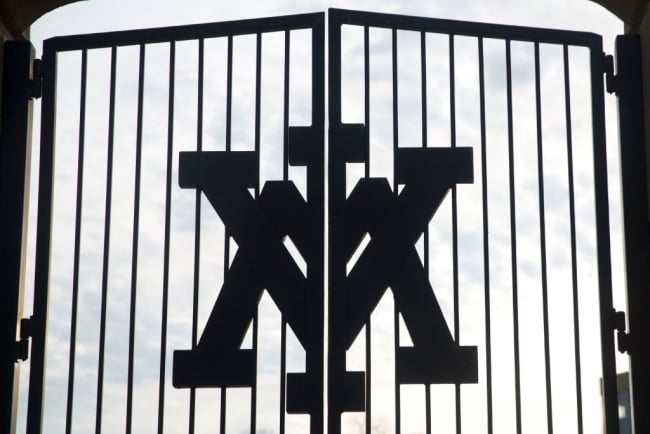You have /5 articles left.
Sign up for a free account or log in.

Heather Rousseau for The Washington Post/Getty Images
The Virginia Military Institute, though it has no explicitly racist or sexist policies, has maintained and allowed a racist and sexist culture that, until recently, it had no appetite to address. That’s the conclusion of the final report on the institute commissioned by the State Council of Higher Education for Virginia that was released Tuesday.
The investigation and report were ordered by Governor Ralph Northam and other legislative leaders in October 2020. That order followed reporting from The Washington Post about racist incidents at the public military institute.
The report, the result of an investigation by the law firm Barnes & Thornburg, paints a picture of an institution where not only do serious problems with equity exist, but leadership shows unwillingness to change or even question its practices.
Racial slurs and jokes on campus, the report concluded, are not uncommon and are excused by administrators. Forty-two percent of African American cadets reported that African Americans are discriminated against “a lot” at VMI. The institute is less diverse than both other Virginia public institutions and other military academies -- cadets of color make up 23 percent of the student body and 41 percent of those dismissed by the institute’s Honor Court. Despite taking some steps to address an outdated and idealized reverence for the Civil War and the Confederacy, the institute still pays disproportionate attention to some Civil War-related traditions, the report concluded.
Gender issues at VMI are also prevalent, the report found, with many interviewees opining that those issues are worse than racial equity issues at the institute. Fourteen percent of female cadets who answered a survey said they had been sexually assaulted at VMI, and many female cadets generally expressed a consistent fear of sexual assault or harassment. Institutional policies, such as not allowing any cadets to lock their doors or lower their blinds when not actively changing, exacerbate these problems, the report concluded. Virginia law makes it illegal for a university to punish a student for a drug or alcohol offense that comes to light as a result of a sexual assault report, but VMI is afforded a carveout from that policy.
“Cadets, alumni, and faculty repeatedly described the culture at VMI as one of silence, fear, and intimidation, especially as it relates to the reporting of problems or issues that reflect negatively on the institute or its leaderships,” the report said. “Interviewees reported that, in some sexual assault cases, members of the VMI administration have actively dissuaded victims from making reports.”
In some cases, sexual assault accusations presented through proper channels were not addressed by the administration. In others, administrators encouraged accusers to think of the effect their report would have on the careers of their assaulters.
The chilling culture of “silence, fear and intimidation” is also one that the legal team running the investigation experienced for themselves at the institution, they wrote in the report.
“Just one example of this was when VMI attempted to, and in some cases did, put VMI attorneys in rooms with interviewees under the guise of legal representation, knowing that the attorneys’ presence would chill or limit the candor of the interviewee,” the report said. “VMI also withheld requested information, dissuaded members of the VMI community from participating in or providing information for this report, and has actively sought to undermine the findings in this report before its release.”
Some in the community did not participate because they feared retaliation from the administration, the authors wrote. The vitriol and criticism regarding the investigation has been unusual and alarming, they said.
“VMI also sought to keep members of the VMI community, including current senior administrators, from participating in interviews, and it engaged in public messaging designed to encourage the VMI community to disbelieve and reject this report, particularly when their efforts to thwart the investigation proved unsuccessful,” authors wrote.
Ultimately the report concluded that racism and sexism are present, tolerated and left unaddressed. Though the institute has promised change, it will likely only follow through on reforms if it is forced to do so. The authors recommended many reforms for the institute, including the creation of a diversity, equity and inclusion plan and regular written reporting on progress of the plan to stakeholders including the State Council of Higher Education for Virginia, as well as specific efforts to improve diversity in leadership, alter traditions, temper associations with the Civil War, address inappropriate language and behavior, and encourage transparency.
A statement from John William Boland and Thomas Watjen, president and president-elect of the Board of Visitors of VMI, respectively, said that the report includes serious allegations that are being treated as such.
“VMI is not immune to the challenges all colleges face in this area, and there have been incidents on our campus which we have documented and shared as part of this investigation. Let us be clear though, this behavior has never been tolerated and, as an oversight board, we are committed to assuring every action is being taken to maintain a safe and welcoming environment for all at our school,” they wrote. “During the time this investigation has been ongoing, VMI has been busy taking action on many of the concerns that were identified earlier last year. While there is more to be done, these recent changes follow a history of taking steps to improve diversity, equity and inclusion at the Institute, and we expect to continue to do so.”
The report took aim at Boland himself for his rhetoric around the report and bigotry at the institute. In an October 2020 letter to the governor, Boland wrote, “Systemic racism does not exist here and a fair and independent review will find that to be true.”
“It has been apparent that VMI wants nothing to do with an actual independent review, and will only consider a report ‘fair’ if it supports VMI’s own assertions,” the report said.
Major General Cedric Wins, who came on as superintendent of the institute in April and who is Black, said in a statement that recommendations from the report will be evaluated through the lens of VMI’s mission.
“Since my arrival, I have said there is no place at VMI for racism, sexism, homophobia, xenophobia, or any other type of discrimination. During my time as superintendent, the Institute will be a place where each and every member of the Corps of Cadets, faculty, staff and alumni feels a part of the VMI legacy regardless of race, gender, religion, ethnicity, nationality, or orientation,” he said in a statement. Last month, his office released an assessment and action plan entitled “One Corps, One VMI.” One of that plan’s five outcome objectives is diversity and inclusion.
In conclusion, report authors expressed some hope for VMI’s future. “Should it choose to do so, VMI can embrace change while still retaining its core values. An honest and open examination of the race and gender issues at VMI, coupled with a commitment to progress and change is required to allow the VMI experience to be a challenging but safe and welcoming experience for a more diverse population of young people,” they wrote. “To say the least, VMI has never undertaken that examination.”




